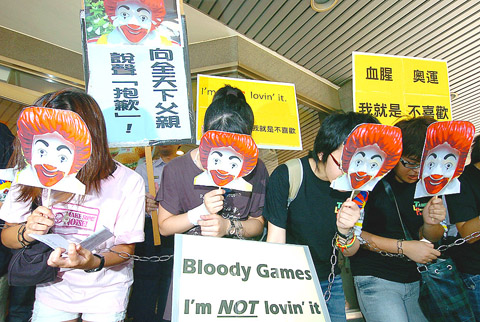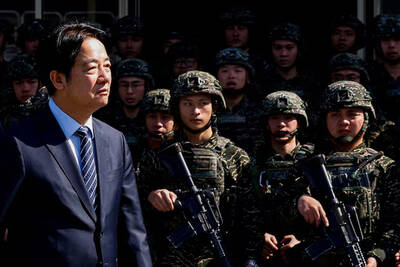By Loa Iok-sin
Staff Reporter
Human rights, environmental, pro-Tibet and pro-democracy groups protested in front of McDonald’s headquarters in Taipei yesterday, slamming the firm’s sponsorship of the Beijing Olympics and urging a boycott of all Olympic sponsors.

PHOTO: LIU HSIN-DE, TAIPEI TIMES
“I’m sorry, I only care about making money, not human rights,” protesters wearing Ronald McDonald masks said to passers-by and distributed flyers about human rights abuses in China and McDonald’s sponsorship of the Games.
“The Chinese government represses freedom of speech, of religion, of the press, and fails to defend the independence of its judiciary and laborers’ rights,” said Lin Fang-ju (林芳如), a member of the Taiwan Free Burma Network.
“It also violently cracks down on Tibetan demonstrators and supports authoritarian regimes in Myanmar and Sudan responsible for thousands of deaths,” he said.
The groups want McDonald’s to “release an open letter condemning China’s human rights abuses, and add human rights awareness education in children’s education services provided by Ronald McDonald House,” Lin said.
“If human rights abuses in China continue to worsen after the Games, McDonald’s should promise to halt sponsorship of any sports event held in China,” she said.
“A company should take some corporate social responsibility” and McDonald’s should do so by withdrawing its sponsorship of this particular Games,” said Robin Winkler, director of the Wild at Heart Legal Defense Association.
“Otherwise, McDonald’s is in fact endorsing repression by the Chinese government,” he said.
Green Party Secretary-General Pan Han-sheng (潘翰聲), urged a boycott of all Olympic sponsors, including McDonald’s and convenience store chain 7-Eleven, as its parent company, Uni-President Enterprises Corporation is sponsoring the Games.
Meanwhile, initiated by the Regional Tibetan Youth Congress Taiwan, Tibetans in Taiwan and their supporters marched in Taipei to protest the occupation of Tibet.
“Since China first cracked down on Tibetan demonstration against Chinese rule in March, more than 200 people have died and 6,000 are missing,” Taiwan Friends of Tibet chairwoman Chow Mei-li (周美里) told a crowd gathered at 228 Peace Park.

The Taipei Mass Rapid Transit (MRT) Wanda-Zhonghe Line is 81.7 percent complete, with public opening targeted for the end of 2027, New Taipei City Mayor Hou You-yi (侯友宜) said today. Surrounding roads are to be open to the public by the end of next year, Hou said during an inspection of construction progress. The 9.5km line, featuring nine underground stations and one depot, is expected to connect Chiang Kai-shek Memorial Hall Station to Chukuang Station in New Taipei City’s Jhonghe District (中和). All 18 tunnels for the line are complete, while the main structures of the stations and depot are mostly finished, he

The first global hotel Keys Selection by the Michelin Guide includes four hotels in Taiwan, Michelin announced yesterday. All four received the “Michelin One Key,” indicating guests are to experience a “very special stay” at any of the locations as the establishments are “a true gem with personality. Service always goes the extra mile, and the hotel provides much more than others in its price range.” Of the four hotels, three are located in Taipei and one in Taichung. In Taipei, the One Key accolades were awarded to the Capella Taipei, Kimpton Da An Taipei and Mandarin Oriental Taipei. Capella Taipei was described by

Minister of Economic Affairs Kung Ming-hsin (龔明鑫) yesterday said that private-sector refiners are willing to stop buying Russian naphtha should the EU ask them to, after a group of non-governmental organizations, including the Centre for Research on Energy and Clean Air (CREA), criticized the nation’s continued business with the country. While Taiwan joined the US and its Western allies in putting broad sanctions on Russia after it invaded Ukraine in 2022, it did not explicitly ban imports of naphtha, a major hard-currency earner for Russia. While state-owned firms stopped importing Russian oil in 2023, there is no restriction on private companies to

President William Lai (賴清德) is expected to announce a new advanced “all-domain” air defense system to better defend against China when he gives his keynote national day speech today, four sources familiar with the matter said. Taiwan is ramping up defense spending and modernizing its armed forces, but faces a China that has a far larger military and is adding its own advanced new weapons such as stealth fighter jets, aircraft carriers and a huge array of missiles. Lai is expected to announce the air defense system dubbed “Taiwan Dome” in his speech this morning, one of the sources said. The system